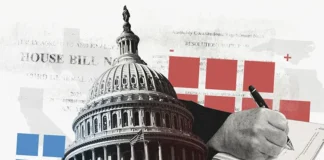By Christian Watson
This week, the Food and Drug Administration will be hosting listening sessions ahead of its proposed ban on menthol cigarettes. While the attending bureaucrats will certainly rehash the data we’ve known for decades about the dangers of smoking, they’ll also be hearing a new spin from progressives: Banning menthol is essential to achieve “racial equity.”
While “racial equity” is an admirable goal, this ban on menthol threatens to do more harm than good for the Black people these activists purport to want to protect – just as many other race-based paternalistic laws have done in the past.
In its announcement of the ban, Acting Food and Drug Administration Commissioner Janet Woodcock said the goal of banning menthol “will help save lives, particularly among those disproportionately affected by these deadly products,” later adding that the ban will “address health disparities experienced by communities of color, low-income populations, and LGBTQ+ individuals, all of whom are far more likely to use these tobacco products.”
The administration was clear: This policy is targeting black smokers. Nearly 85 percent of African-Americans who smoke often choose menthol cigarettes, according to NBC news. And clearly, the Biden administration believes it can risk leaving so-called “cowboy killers” on the shelf for white smokers, but the nation cannot risk black smokers having access to their preferred product.
The Biden administration thinks they are helping protect the health of black Americans by paternalistically stepping in and stopping them from smoking. To be fair, some black leaders have endorsed this policy. But this would not be the first time that well-meaning leaders have pursued policies that ended up harming black Americans.
The clearest example of this is the Nixonian drug regime of the early 70s. President Nixon signed the “Controlled Substances Act of the 1970s.” The act essentially made owning, possessing, manufacturing, and importing certain substances (like marijuana) a federal crime.
After the passage of this act, Harlem Congressman Chuck Rangel urged Richard Nixon to ramp up his efforts against drugs. He particularly cited the ongoing heroin epidemic sacking New York City in 1971 to justify military action against drug use in African-American communities. Similarly, Reverend George McMurray, the lead pastor at the Mother A.M.E. Zion Church in Harlem, believed heroin users should spend life in prison.
“When you send a few men to prison for life, someone’s going to pass the word down,” McMurray said.
The War on Drugs was supposed to help black communities. Instead, it disproportionately sent black men to prison for non-violent crimes like possession of marijuana.
This is precisely how “racist” laws are created. The only difference between Nixon’s War on Drugs and Biden’s menthol ban is time.
Every other condition has been met. Nixon, just like Biden, sought to penalize non-violent crimes to achieve a socially-engineered vision. Nixon, just like Biden, thinks government force can make people stop bad habits. And Nixon, just like Biden, will be proven wrong by history if the ban takes hold.
Of course, the Biden administration states that enforcement of the ban will only be on businesses, not individuals. But many, including the mothers of Eric Garner and Trayvon Martin, aren’t buying.
“We have seen the unimaginable and irreversible harm result when policies enacted with the best of intentions are translated into practice,” they stated, later adding, “While we have been told that black smokers will not be criminalized for possessing menthol cigarettes, that does not match our experience with other cigarette policies.”
Black Americans do not need the government to prohibit them from smoking, drinking, eating fast food, or any other behavior the FDA frowns upon – especially when it could exasperate the already fraught relationship between police and the black community.
Americans of all races can understand the health risks of smoking. Instead of stepping in to hold the hands of black consumers, perhaps Biden would be wise to deliver a message of personal responsibility.
Drugs, like moonshine during Prohibition, are not going anywhere. And they are still used by people of all demographics. Biden should review his history and his menthol policy.
Christian Watson is a spokesman for Color Us United, and the host of Pensive Politics with Christian Watson. Follow him on Twitter at @officialcwatson.
















